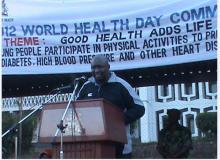2012 World Health Day commemoration demonstrates healthy life styles to prevent non-communicable diseases among civil servants in Malawi
Lilongwe: On 29 June 2012, in commemoration of 2012 World Health Day, the vice President Honorable Khumbo Kachali who is also the Minister of Health, led all civil servants at Capital Hill, the helm of government ministries, to demonstrate and emphasize the need to ‘practice what you preach’ in prevention of non-communicable diseases. The Minister accompanied by the WHO Resident Representative Dr Felicitas Zawaira, the Minister Responsible for Persons with Disabilities and the Elderly, Hon Reen Kachere, MP, the Chief Secretary, who is the Head of Civil Service, six Principal Secretary from various ministries and all civil servants working at Capital Hill walked a three kilometer track that winds around the Capital Hill perimeter. The walk was a demonstration of physical activity as one of the behaviors that prevents non-communicable diseases such as high blood pressure, diabetes and chronic respiratory and cardiovascular diseases.
The walk was organized by the Ministry of Health in collaboration with the World Health Organisation and the various government sector ministries to commemorate the World Health Day by walking around the Capital Hill. This year’s World Health Day theme Ageing and Health, with the slogan: Good health adds life to years, is highlighting the fact that ageing is a natural process that requires physical, mental and social preparation and therefore concerns each and every one of us.
After the three kilometre walk all who participated gathered at the Ministry of Health headquarters car park where there was an official launch of ‘the health life style promotion among civil servants.’ Speaking to the audience to convey the WHO message for the day, Dr Felicitas Zawaira reminded everybody present that growing old and being in good health requires the adoption of healthy lifestyles throughout a person’s lifespan. “There is abundant knowledge on how to promote healthy lifestyles across population groups, such as healthy diet, regular exercise, non-use of tobacco, and refraining from harmful use of alcohol,” she said.
Elderly people contribute to socio-economic development of a country, hence the need to adopt good policies on ageing. The elderly (defined as those aged 60 years or more), in Africa have always been revered as the source of wisdom and guardians of beneficial cultural practices, family unity and identity. They continue to play a pivotal role in the care and support of children. In return, the young and adults should take care of the elderly as part of the African extended family. This reciprocal relationship of care and support between the elderly and young is a hallmark and should be promoted as a key component of achieving healthy ageing. Growing old and being in good health requires the adoption of healthy lifestyles throughout a person’s lifespan.
In his speech at the launch of the health life campaign, Honourable Khumbo Kachali said that in order to make a difference and help all Malawians including the elderly to lead quality and productive life, his ministry was hereby calling for promotion of healthy-life-styles that can be achieved through the following: 1, physical activity: through walking, jogging, cycling or engaging in any other sporting activity, 2, healthy diets: by insisting on low fat diet, low sugar diet, reduced salt intake, more green vegetables and fewer meats, 3, refraining from excessive consumption of alcohol, 4, not smoking or stopping smoking tobacco, 5 access and utilization of health screening services for diseases such as diabetes, cancers and hypertension. “I am therefore appealing to all partners and stakeholders including the media houses to join hands with the Ministry of Health in disseminating healthy-life-style promotion messages. Let us unite towards good health to add life to everyone’s years,” he said.
During the ceremony everyone that participated in the walk was served with water, local juice ‘thobwa’ which is high in fibre, fruits such as pine apples, apples, grapes and oranges and brown bread. This was a demonstration of an example of healthy foods. People were free to discuss the local foods that they thought make people healthy. They also had their BP, weight and height measurements taken. The campaign was important because while Malawi and other African countries continue to face the burden of persistent infectious diseases, the prevalence of chronic non-communicable diseases is also on the increase. If detected early and managed with appropriate treatment and care, non-communicable disease such as cancers, hypertension, diabetes and chronic respiratory diseases can be controlled leading to alleviation of disability and pain during ageing. In this regard, the Minister and Chief Secretary undertook that this exercise by civil servants would not be a one off event but that it will become the norm for civil servants to adopt these healthy lifestyle behaviors.
Honorable Khumbo Kachali MP Vice President Of The Republic Of Malawi And Minister Of Health Address The Audience After The Wellness Walk The Honorable Minister Appreciates The Healthy Foods On Display And On The Right A Health Workers Measures His Blood Pressure1 The Honorable Minister Appreciates The Healthy Foods On Display And On The Right A Health Workers Measures His Blood Pressure2
________________________________________________________________
For more information contact Mr. H.W. Kubwalo, World Health Organisation, ADL House, PO Box 30390, Capital City, Lilongwe 3. Tel: 01 772 755 Email: kubwaloh [at] mw.afro.who.intor






